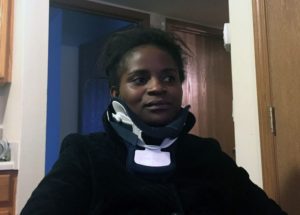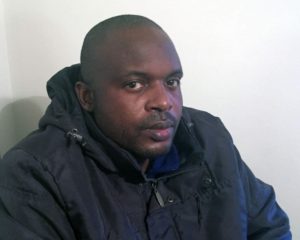Caring for dead, injured depleting community’s resources
They had only been in the United States for a few weeks when an encounter with a patch of ice in the early morning hours of Feb. 4 changed everything.
Nancy Lusemo, Serge Baketela and Mirielle Mbambi were three of nine people carpooling in a minivan and on their way to work in Tama when the vehicle lost control on the ice. They survived, which should make them the “lucky” ones, but the moniker smacks of indecency.
Three were transported to area hospitals and released relatively quickly. Three others — Michka Kebeya, Platini Namputu and Dickson Mandiki — died in the four-vehicle crash. Kebeya was Lusemo’s husband. The couple and their five-year-old son had only been in Iowa about two months.
All of the carpool occupants were relatively new residents to the U.S., having immigrated from the central African nation of Congo as part of the Diversity Visa program. Participating in that program’s lottery, they had received permanent resident cards through the U.S. State Department.
Lusemo, 32, and Baketela, 35, speaking through translators, said they don’t remember the accident or its immediate aftermath. That’s probably a blessing.

“We found him (Baketela) at St. Luke’s Hospital in Cedar Rapids. We didn’t know where he was, and he was unconscious,” explained Danny Mpoyi, a member of the close-knit Congolese community in the Cedar Rapids and Iowa City area.
Lusemo and Mbambi, 34, had been transported too, although who initially went where is fuzzy. Such specific details got lost in the shuffle as the Congolese community scrambled to ensure the care of children, made life support decisions, arranged emergency medical insurance and went about the grim task of honoring and burying their other three friends.
Once stabilized, the three seriously injured survivors were transported to University of Iowa Hospitals and Clinics in Iowa City, where each underwent multiple surgeries. They were later moved to Covenant Medical Center in Waterloo, where they stayed until April 1 — the day after their emergency Medicaid expired.
“I didn’t feel I was ready to be discharged,” Lusemo said, while noting her appreciation for all of her medical caregivers following the accident. “It’s still very difficult.”
While those injured were covered by emergency Medicaid, the Congolese community made arrangements for new medical insurance under the Affordable Care Act, said Peter Nkumu, who serves as the organization’s president. That insurance took effect on April 1, the day the three were discharged.
“We weren’t prepared (for them to be discharged),” Nkumu said. “Only a few pieces were in place so that we could help them continue with their rehabilitation. We’re struggling with transportation, with living expenses and more.”
This past weekend the Congolese community rented a two-bedroom Cedar Rapids apartment, shared by Lusemo and Baketela. Mbambi has relatives in Cedar Rapids and was able to move in with them while she continues to heal.
All three have a long road of recovery ahead.
The two women, Lusemo and Mbambi, suffered similar life-threatening injuries, mostly to their neck and pelvic regions. Baketela’s worst injury was to his left side, primarily hip to foot. They are all confined to wheelchairs, have no mobility and little ability to care for themselves.
“I can stand for short periods of time, but only if I am holding something for balance,” said Baketela, who struggles with nerve damage.
Lusemo, who cannot stand at all, sees her five-year-old son every one or two weeks. He continues to live with a very generous support staffer from his Cedar Rapids elementary school until his mother can care for him and herself. At the time of her husband’s funeral, she had just gotten off life support.

Baketala’s plans to reunite with his fiance and their infant daughter have been indefinitely postponed. He came to the U.S. when his daughter was a week old, and she and her mother are still in Congo. Because Baketela is unable to work or care for himself, immigration officials are hesitant to bring his family stateside.
“I cannot care for myself, how can I care for my family?” he asks.
There is currently no estimate on when the two will recover enough to return to work, or if permanent damage may require new job skills training.
“I came to this country and Iowa with a dream,” Lusemo said. “The accident and these events have certainly dimmed that dream, but it still is there. I still want to realize it.”
Baketela agrees. “God permitted this to happen,” he said. “I don’t know why, am not sure I ever will. But there’s no one to blame for this; it has not taken away my joy for having an opportunity to make my life here. I’m looking forward to moving on with my plans.”
The Congolese community in Iowa is relatively small, about 300 families on the eastern side of the state. Many are focused on stabilizing themselves in their new country, and don’t have a great deal of extra resources for charity. Still, the community has come together to provide funerals and burials for the three members who died in the accident. They have stood by the injured members too, helping them navigate their medical needs.
But the truth is that those needs are outpacing the community’s resources. Members who work are unable to offer transportation to and from doctor’s appointments. Providing even the bare minimum of necessities for Lusemo and Baketela is expensive.
Readers interested in helping, please reach out to me and I will place you in direct contact with Nkumu and Mpoyi of the Congolese community.
This column by Lynda Waddington originally published in The Gazette on April 10, 2016. Photo credit: Lynda Waddington/The Gazette
